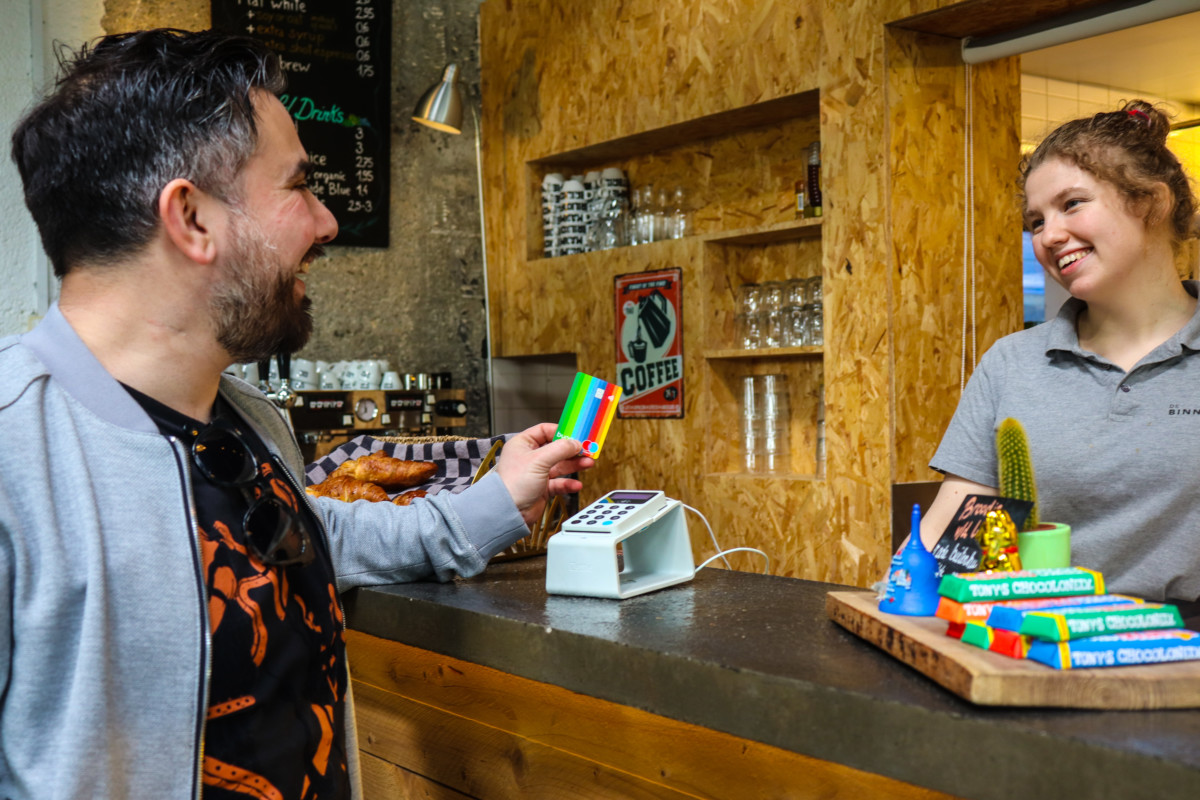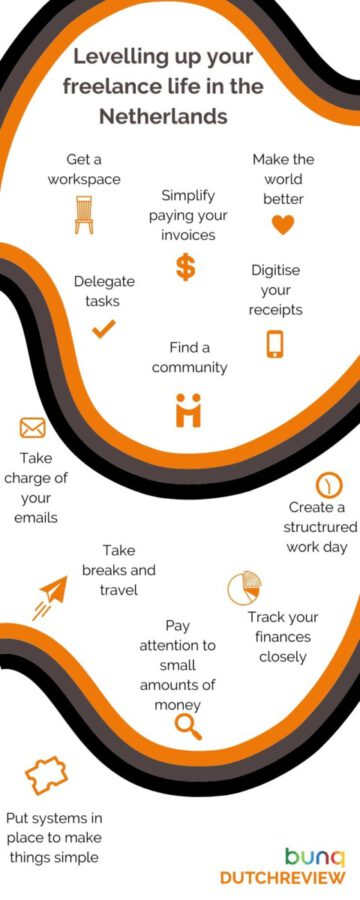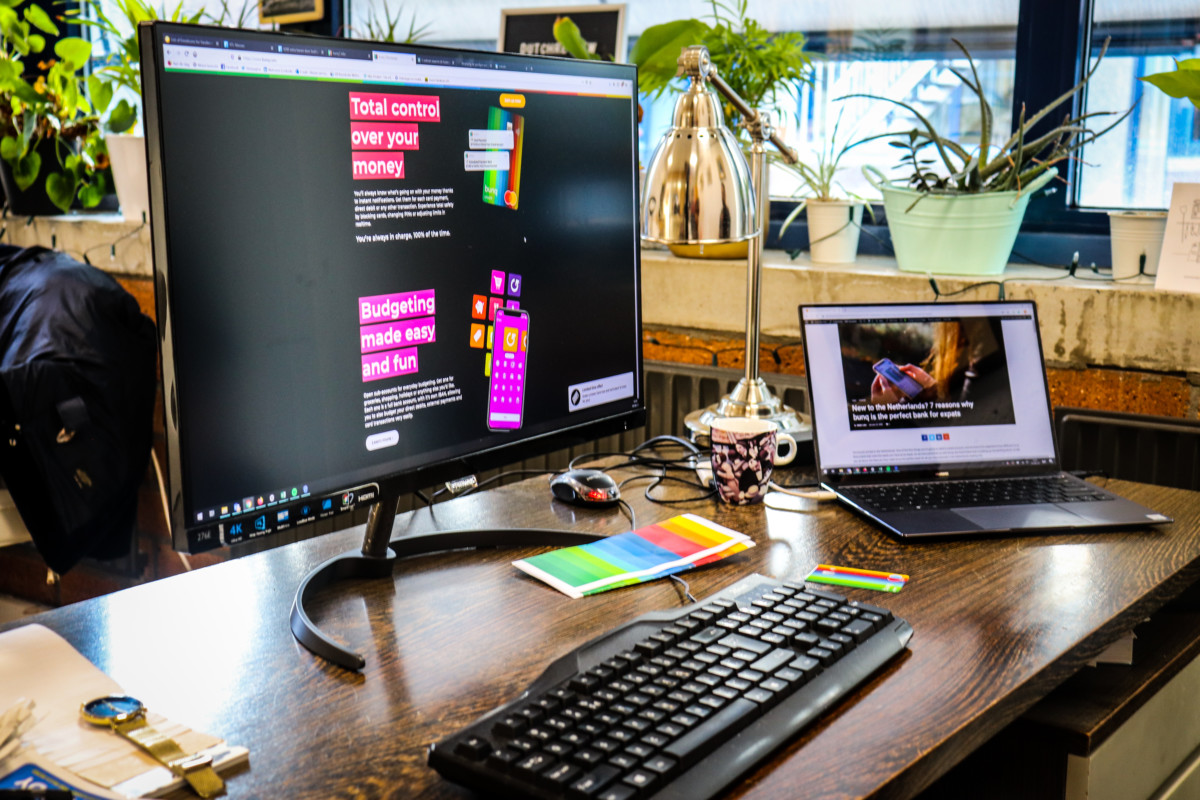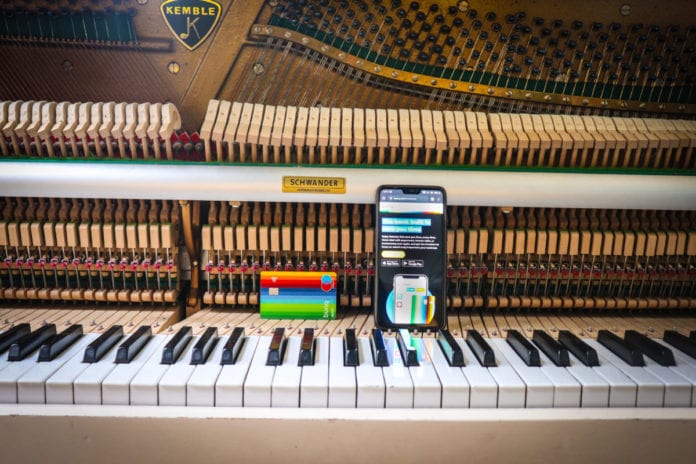Being a freelancer anywhere is stressful and complicated. From chasing payments to looking for new clients, it feels like nothing is easy. And while we can’t give you a step-by-step guide to making it big (if you have a guide like that, feel free to pass it on to us 😉), we can let you in on a couple of tricks we’ve learned over the years which have made our freelance life in the Netherlands so much easier.
Something that has made freelancing in the Netherlands so much easier for us is doing our business banking with bunq, a revolutionary bank from the Netherlands. They’re a completely digital bank with awesome customer service in lots of languages and a super-easy setup system. We’ve raved about them previously because of how great they are for expats, and we also think they’re the perfect bank for freelancers. So we sat down with them to talk about all the ways you can improve your freelancing experience in the Netherlands, and came up with these twelve points. Some of them showcase bunq Business Account features, and some are more general, but they all will contribute to helping you find freelancing freedom in the Netherlands.
Try to keep your freelancing in the Netherlands structured
A lot of us get into freelancing for the flexibility, but there’s a point at which that can be a disadvantage as well, especially if you’re someone who *cough* sometimes procrastinates *cough*. One advantage of working in an office is being accountable to someone: when you’re a freelancer, you’re only accountable to yourself, which is difficult at the best of times. There is always the danger of being so flexible with yourself that you get nothing done (this is obviously not a danger that we have ever experienced personally, of course).

One way to combat this is by being really structured and strict with your time. Maybe you don’t want to work a 9-to-5, but keeping to an eight-hour-day rhythm can be really helpful. It allows you to have a work-life balance, and to have a sense of accomplishment when you finish the day — because there is always more work to be done when you’re freelance. In the long run, having a good work-life balance will make you a better and more effective freelancer — and indeed, a happier person as a whole.
Freelancer in the Netherlands: keep on top of your email, but don’t let it drown you
Email is a tricky thing: it’s easy to feel very productive when you answer a bunch of emails, but often you’ll slowly realise that nothing concrete has actually been accomplished by your answering of them. At the same time, at least for most freelancers, a lot of your work will come in via email, so it is important to keep on top of it. But how do you balance these two desires? On the one hand, you want to save your energy for productive tasks, on the other hand you need to bring in new customers.
People have lots of different strategies for this, but they all centre around the idea of structures and systems. Some people will put a time limit on being in their email account: an hour in the morning, an hour in the evening, or something like that. Or they will only open their email when they are able to handle what is in those emails immediately — so not, for example, when they are working on something else. You’ll find for yourself what works for you, but as with almost all of these tips, the key is being structured with your time and your processes for dealing with all the different aspects of freelance life in the Netherlands.
Make freelancing in the Netherlands easier: scan all your receipts
One of the major differences I’ve noticed between freelancing and that salaried life is the receipts. It’s a real nightmare to gather paper receipts all year in preparation for tax season. They take up space, you lose at least half (maybe that’s just me), and they get easily crumpled, hard to read, and just plain annoying to look at, reminding you of all that hard-earned cash that is now languishing in someone else’s pocket.
Leaving aside all that emotional trauma, gathering your receipts digitally really helps with the physical issue of storing them and keeping them organised. The bunq app allows you to scan all your receipts and connect them all in one go to a particular payment. In future, you can also use this app to search for a particular receipt by keyword. And you can use this app to download PDFs of receipts so you can send them to the relevant parties — for example, to your bookkeeper.
Choose systems that make freelancing in the Netherlands easier
There are always multiple ways to do things, especially when it comes to administrative tasks. Often, we choose to do these tasks in the traditional way: for example, doing things manually or on paper. In our experience, this is one area of life where the digital world is your friend. Inventors and entrepreneurs are constantly innovating when it comes to digital management systems, and bunq is no exception.
There are so many apps developed by bunq that can automate or simplify your business. But because a lot of these are particular to the type of business you’re running, we’re going to focus on just one. By choosing a business account with bunq, you can automatically export your statements and receipts each month to your bookkeeper’s email account. Your business might not yet be big enough to require a bookkeeper, but if it is, this will simplify your life so much.
Know what’s in your bank account at all times, and know why it’s there
It’s very easy to look at a delicious pile of money in your account and start feeling all spendy. If you want to avoid financial ruin (or, less dramatically, an unexpectedly tight month), then we recommend using an app that allows you to keep a clear overview of your finances — like bunq’s business account.

You can sort your money into different accounts, labelled with what you’ll be using it for, just to remind yourself that you can’t actually afford those organic vegetables. You can instantly move funds around if you need to, so no worries there, but being able to visualise what money you have and where it’s destined to go is really helpful. Plus, uh, you can use emojis in the account names. So there is really no reason that you would not want to do this.
Build yourself a community of freelancers
When you’re freelancing, things can get lonely, fast. That’s no fun, especially as most people tend to get more productive around other people. Otherwise, you might find yourself lounging on your sofa, cosy but kind of disgusting in pyjamas, listlessly scrolling Facebook on your laptop when you should be writing emails to potential clients. We’ve all been there.
Maybe you already have freelancer friends, but if you don’t, a great place to meet them is through freelancer meet-ups. Most cities will have them at least monthly, and the easiest way to find them is by searching “freelance [your city]” on Facebook. But another option could also be finding a regular work cafe, maybe even one dedicated to being purely for freelancers or people who work from home. After all, frequently meeting the same people is the best way to make friends with them.
| Speaking of freelancer communities, we work at one ourselves here in Leiden! PLNT is a centre for entrepreneurs and startups with a super active community, lots of plants, and beautiful workspaces. Also, we have pet chickens on the roof. |
Freelancing in the Netherlands: automatically pay your invoices
It’s not that you don’t want to pay people. It’s just that, well, life gets in the way (and also you don’t want to pay people). So, instead of getting the invoice, reading it, crying, opening your banking app, crying, deciding you’ll wait ’til tomorrow to pay, forgetting to pay, and getting sued, we recommend automatically paying your invoices. That of course doesn’t mean that as soon as an invoice appears in your email account it gets sucked out of your bank account without your oversight — that would admittedly be creepy and terrifying.
So, uh, not that — but bunq has a system which simplifies the whole process of paying someone, to the extent that it doesn’t feel like doing the worst thing in the world. bunq’s business account app allows you to scan an invoice and immediately pay, with the payment details automatically loaded into the app. It’s a super handy feature, allowing you to save heaps of time as well as cutting down on that emotional trauma, and ensure you aren’t that annoying client.
| Bonus Pro Tip: bunq allows you to set aside VAT automatically, so when it’s tax time, you don’t have to worry about scraping the money together to pay the tax man. It’s already in your VAT account, ready to go. |
Level up your freelance experience in the Netherlands: delegate tasks if you have employees
While you will likely start small when you begin freelancing, you might eventually end up with employees. This should be a time when your workload decreases, as you can delegate tasks to your new colleagues easily. It’s always nice to have someone to discuss things with, and once your employees are settled in, it’s time for you to take a step back and let things happen.
If you want to do this with peace of mind, especially when it comes to money, you’ll need a system that allows you to quickly grant permission to employees to use the company account, and just as quickly take away that permission if need be. bunq’s business account has an added advantage in this regard: your employees can be allowed to access only certain sub-accounts, so they don’t have access to all of the company’s assets.

Take advantage of freelancing in the Netherlands and travel
Part of the reason you decided to become a freelancer was likely because of the increased flexibility working for yourself brings. But it’s very easy to forget you ever had dreams of shorter days or regular travel when you began, now that you’re in the midst of projects, deadlines, or money stress.
Do try to take advantage of travelling when you can though! Especially if you work in a creative industry, then the change of scene is likely to imbue you with fabulous new ideas. And breaks from work are crucial if you want to avoid burnout, which can be a real problem amongst freelancers.
Freelance life in the Netherlands: pay attention to small amounts of money
It’s easy to focus on big amounts of money when you’re freelancing — I always find that when you have a number you can convert into “rent” or “groceries for the month”, it’s a lot easier to instinctively value it. But actually, it’s also important to pay attention to small amounts of money, because as much as it’s a cliché to say it, everything adds up. As the saying goes, save a match, buy a farm. Now, you might not want to buy a farm, but you almost certainly want to improve your general financial situation. So basically, don’t dismiss opportunities to increase your revenue, even if it’s only a small amount.

One way that you can earn that extra coin with no effort on your part whatsoever is paying attention to the interest rates your bank offers. bunq offers the highest interest rates around — 0.27 percent currently, which is a whopping nine times higher than any other bank.
Not only that, but the interest rate is applied to all of your sub-accounts, not just your savings account, so you’re getting as much interest as possible. And, best of all, you get paid that interest monthly, so no waiting until the end of the year to figure out what you’re getting. Basically, this is the perfect, zero-effort way to make a little bit of money — and little bits of money always come in handy in the end.
Stability while freelancing in the Netherlands: get yourself a regular workspace
When you become a freelancer, you’ll likely work from home, and it can be really tempting to just work from the kitchen table — especially if you’re tight on cash and don’t feel ready to invest in a fancy desk and chair. It’s totally fine to work anywhere, but it’s best if it is the same place most of the time, and it should be a quiet place where people won’t disturb you.
Something that worked for me when I was a student was sitting on a cushion on the ground in my bedroom and using a coffee table (which I somehow owned before a desk) as a table. It worked! Though admittedly, an actual desk is a lot more fun, so I’d still recommend that above my cushion contraption. But basically, be creative and form your own space. If you’re the kind of person who is easily distracted, check out coworking spaces near you — many big cities even offer free spaces for freelancers to work!
Freelancing in the Netherlands: try to make the world a better place
A lot of us come into business hoping to make the world a better place, but it’s easy to lose sight of that amidst money stress, employee drama or just daily life. You can get sucked into the grind and forget what made you want to be a freelancer in the first place. To be fair, solving the world’s problems is a pretty big ask, so it makes sense that most of the time, it feels easier to put out head down and ignore it all. But just because you can’t solve the world’s problems all by yourself doesn’t mean that you can’t make the world better in some tiny ways.
| In addition to controlling where your money is invested, bunq also has just started offering a Green Card! This is a beautiful, stainless steel card that lasts longer than a plastic one. Every time you spend 100 euros with the card, you plant a tree — so if you’re using a Green Card with your business account, you’ll soon have a forest planted. |
One way you can do this is by taking control of where your money is invested. If you’re running a business, you might have quite a significant amount of money in your bank account, but even if you don’t, where it is invested matters. After all, it can either go towards, for example, backing renewable energy companies rather than fossil fuel ones. And, best of all, it’s the sort of change you can make with very little effort, especially with bunq, where all the investments they make are ethical, and where you have total control over the enterprises your business supports.
Freelancing is an amazing way to work if you get it right, and setting yourself up for success is the surest way to have a great start. Doing your business banking with bunq will definitely help with that — it has for us, that’s why we’re so happy to bring you an article with them.
Got any other freelancing tips for us? Let us know in the comments below.
Feature Image: DutchReview
Editor’s Note: This article was originally published in February 2020, and was fully updated in December 2020 for your reading pleasure.



